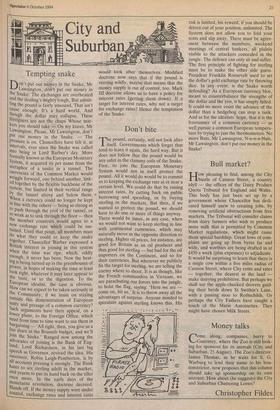City and
Tempting snake Don't put our money in the Snake, Mr Lawsington, don't put our money in the Snake: The exchanges are overheated and the dealing's mighty tough, But admit- ting the pound is fairly unsound, That isn't cause enough: It's a hard world, And though the dollar may collapse, These foreigners are not the chaps Whose mar- kers you should take — On my knees, Mr Lawsington, Please, Mr Lawsington, don't Put our money in the Snake. — The pressure is on. Chancellors have felt it, at intervals, ever since the Snake was called into being in Lord Barber's day. More formally known as the European Monetary System, it acquired its pet name from the metaphor of a snake in a tunnel. The currencies of the Common Market would wriggle forward, one behind another, link- ed together by the flexible backbone of the System, but limited in their vertical range by the tunnel above and below them. When a currency could no longer be kept in line with the others — being so strong as to push through the roof of the tunnel, or SO weak as to sink through the floor — then the member countries would agree to a new exchange rate which could be sus- tained. Until that point, all members must do what they could to keep the snake together. Chancellor Barber expressed a British interest in joining in this system When the time was ripe, which, oddly enough, it never has been. Now the heat- ing is being turned up in the greenhouses of Power, in hopes of making the time at least look right, whatever it may later appear to the taste, or to the digestion. To the European idealist, the case is obvious. How can we expect to be taken seriously in the Community, if we insist on staying outside this demonstration of European unity and presage of a common currency? Such arguments have their appeal, on a lower plane, to the Foreign Office, which must from time to time want to use them in bargaining — 'All right, then, you give us a fair share in the Brussels budget, and we'll ioin the Snake.' Ranged now among the advocates of joining is the Bank of Eng- land. Lord Richardson, in his last big Speech as Governor, revived the idea. His successor, Robin Leigh-Pemberton, is by all accounts pressing it strongly. The Bank hates to see sterling adrift in the market, and yearns to put its hand back on the tiller °nee more. In the early days of the monetarist revolution, doctrine decreed: Hands off. If the money supply were under control, exchange rates and interest rates would look after themselves. Modified doctrine now says that if the pound is veering wildly, maybe that means that the money supply is out of control, too. Mark III doctrine allows us to have a policy for interest rates (getting them down). If a target for interest rates, why not a target for exchange rates? Hence the temptation of the Snake.














































 Previous page
Previous page